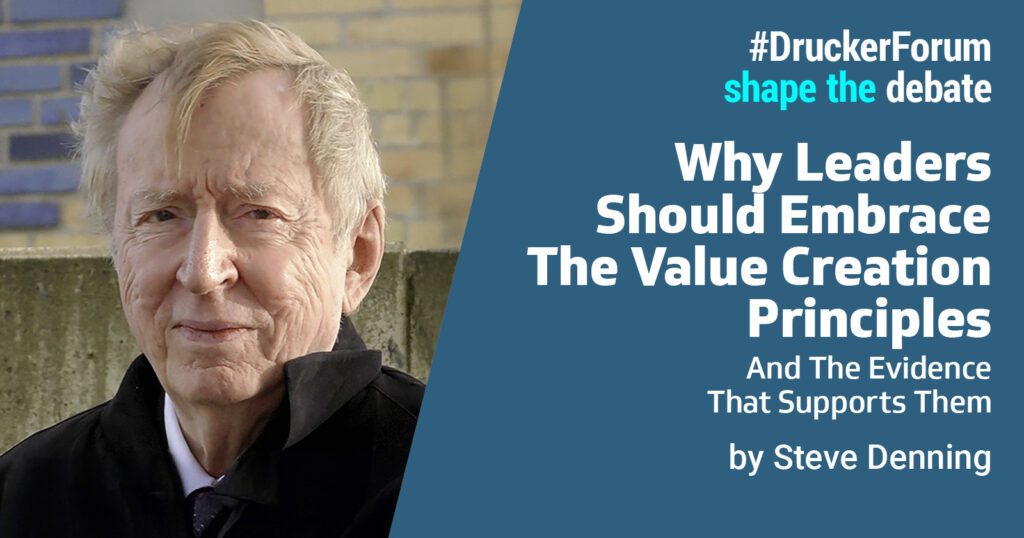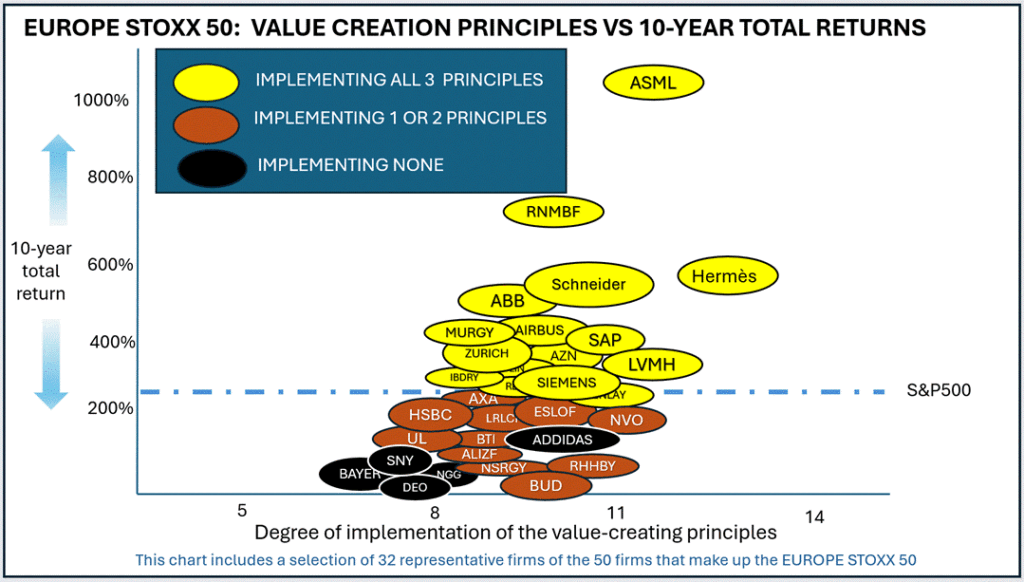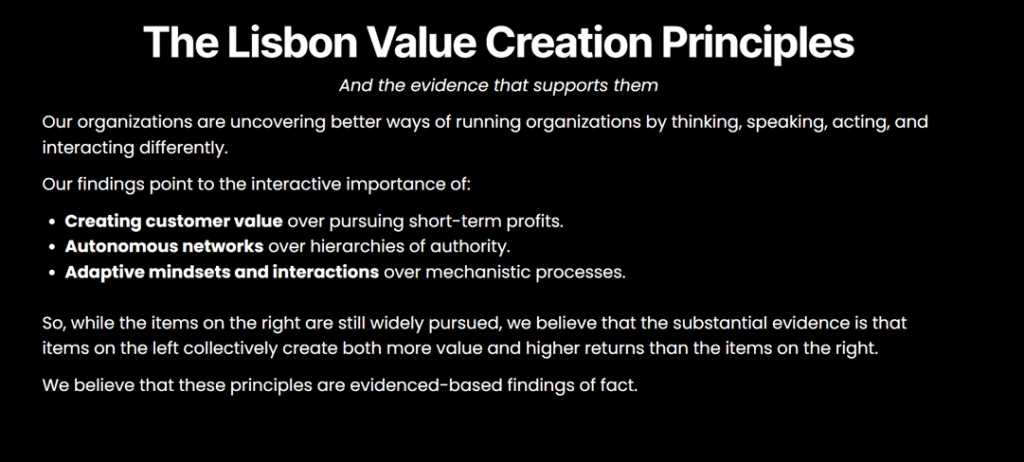
Business management today faces significant challenges, resulting in substantial economic costs. Global employee engagement remains at low levels. A PwC study indicates that customer trust in executives stands at 30%, while executives themselves estimate it at 80%—a notable misalignment. Meanwhile, many public companies deliver 10-year returns that fall short of the average S&P 500. A McKinsey study notes that only 27% of U.S. firms emphasize long-term returns. However, not all is bleak.
The good news? A sizable proportion of smart firms are already implementing evidence-based remedies. As shown in Europe in Figure 1 and in the U.S. in Figure 2, some leading firms are consistent value creators with above-average long-term value. A key factor? Consistent execution of the value creation principles that were considered at the Management Summit in Lisbon on September 22-24, 2025. (Figure 3)
[Figure 1: European Firms Performance Chart]

[Figure 2: U.S. Firms Performance Chart]

Figure 3 Lisbon Value Creation Principles https://www.managementsummit.org/lisbon-value-creating-principles

The Value Creation Principles
These principles outline ways of running businesses that have proven effective in both the U.S. and Europe, based on extensive research by major institutions involving thousands of companies worldwide. As principles, they are more than simply goals or aspirations: principles constitute fundamental beliefs that guide behavior and decision-making over many years. Principles are “the why”—the essentials that govern actions and processes, while goals and targets are temporary endpoints to strive for (the “what”).
The principles are practical and evidence-based, derived from in-depth studies, not just abstract ideals. In essence, firms generally perform better when they:
- Prioritize customer value over short-term profits.
- Foster autonomous networks rather than rigid hierarchies.
- Adopt adaptive mindsets instead of mechanistic processes
The principles interact and reinforce one another. Although conventional, profit-driven mindsets and mechanistic hierarchical processes persist in many organizations, as shown in Figures 1 and 2, research from multiple business institutions and from academia demonstrates that implementation of the principles is associated with greater customer satisfaction, improved workplaces, and stronger long-term financial performance—often by shifting focus away from short-term profits and adapting processes to deal with a rapidly shifting marketplace.
The Benefits of Customer-Centricity
Consider the emphasis on customer value over short-term profits. It’s not a new idea: Peter Drucker himself declared in 1954, “There is only one valid definition of business purpose: to create a customer.” (The Practice of Management, p.36). While implementation of the idea has taken awhile, research now shows that customer-focused companies outperform those primarily driven by profits in long-term returns. For instance, a Deloitte study found that customer-centric companies are 60% more profitable, while McKinsey research highlights 20-30% revenue growth from customer-oriented strategies. Additional studies from BCG, Accenture, and Bain support similar findings. These gains occur because a focus on customer satisfaction cultivates loyalty and supports sustainable growth. McKinsey also notes correlations with reduced customer churn.
Employees benefit as well. Customer-centric cultures are associated with higher engagement. Gallup research shows 20-30% higher engagement, 49% faster profit growth, and 51% better retention in such models, compared to 15-20% lower engagement in profit-focused approaches, which can lead to burnout from efficiency pressures.
Innovation is enhanced too. Studies from Forrester and McKinsey suggest that integrating customer feedback into R&D can yield 60% higher profitability and 20-30% faster growth. In contrast, profit-centric management may result in 10-15% lower innovation outputs, as per related reports.
Technology and AI are utilized more effectively: McKinsey studies indicate that customer-centric firms achieve 35% higher revenue growth through AI and technology, while profit-focused ones may see 10-15% lower returns due to underutilization.
Processes improve: PwC and Experian research points to more efficient budgeting with approximately 20% savings, and Gallup and SHRM studies show up to 50% improvements in staff retention through customer-centric staffing.
Networks Outperform Hierarchies
Networks of self-managing teams tend to deliver better results than traditional hierarchies. McKinsey research shows that agile organizations with such networks achieve 2.5 times higher financial performance and 4.8 times greater innovation. Hierarchies can be hindered by bureaucracy, whereas networks promote agility, as supported by research from BCG and Accenture.
Productivity increases: Gallup studies link autonomous structures to 42% higher output, driven by trust and collaboration. Engaged teams in flatter structures show 14% higher productivity and 78% lower absenteeism.
Innovation benefits: Wharton research indicates that networks boost innovation by 20-30% through rapid experimentation and knowledge sharing, while hierarchies may reduce it by 15-25% due to delays and risk aversion.
Technology integrates more smoothly: Deloitte findings suggest networks adopt technology 20-30% faster, yielding greater value, along with 15-20% higher employee engagement and 10-20% improved customer satisfaction.
Adaptive Mindsets Drive Success
Running an organization in accordance with the principles requires adaptive mindsets across the organization, not just among leaders. For traditional profit-oriented, hierarchical, fixed thinking to give way to adaptable growth-oriented mindsets, leaders need to act as facilitators, providing 50-60% more coaching; middle managers serve as coaches, potentially reducing organizational layers by 20-30%. Without this mindset change, 40-70% of attempted transformations may fail, according to Springer and McKinsey research.
September 2025: The Lisbon Conference Endorses the Value Creation Principles
Leading firms are already implementing the principles. Why not all firms? In September 2025, a group of CEOs and participants from firms around the world met in Lisbon at the Management Summit 2025, along with Richard Straub, President of the Drucker Forum. They came together to discuss the implications of the value creation principles. The outcome? They endorsed consideration of the principles as a better way to run any business.
See who signed, and discover that you too can become a signatory of, the Lisbon Value Creation Principles here: https://www.managementsummit.org/lisbon-value-creating-principles
Endnote
In the two charts, 32 of the 50 European firms in the STOXX Europe 50 (Figure 1) and the 30 U.S. firms in the Dow Jones Industrial Average (Figure 2) are plotted against their 10-year total returns on the Y-axis. On the X-axis is the overall score (from 1-5) on each firm’s performance against the three value-creation principles. The 10-year total returns are sourced from https://seekingalpha.com/.
Individual company data is available here:
European firms: https://www.forbes.com/sites/stevedenning/2025/10/02/how-to-picture-and-understand-europes-stock-market-for-the-first-time/
U.S. firms: https://www.forbes.com/sites/stevedenning/2025/09/28/how-to-picture-and-understand-the-dow-for-the-first-time/
About the author:
Steve Denning is a former World Bank executive, currently a Senior Contributor at Forbes.com, and author of ten management books including The Age Of Agile (2018) and Reinventing Capitalism In The Digital Age (2022).
November 5, 2025
Workshop: Why Leaders Must Accelerate Value Creation
Location: dasForum, Operngasse 17–21, 11th Floor, 1010 Vienna
Learn how the world’s fastest-growing firms think and act differently: detecting change sooner, mobilizing innovation, leveraging AI for human-centered goals, and compounding long-term value. In this hands-on session, you’ll work with peers to translate an integrated, multi-dimensional leadership model into concrete steps for your organization—covering mindsets and culture, customer-first innovation, networks of competence (not steep hierarchies), distributed entrepreneurship, and outcomes for all stakeholders.
With:
- Steve Denning Author and Independent Management Consulting Professional
- Hugo Lourenco Distinguished Entrepreneur, Board advisor, Thought leader
- Heidi Musser cXo, master Agilist, advisor, mentor, TEDx speaker
- Doug Kirkpatrick Organizational change consultant, executive coach and educator
Registration: https://www.druckerforum.org/2025/workshops/
Workshops are free for registered Global Peter Drucker Forum participants.
Not attending the Forum? You may express interest; we’ll confirm based on seat availability.

